![How to Choose an IP Law Firm [With Checklist]](https://img.shgstatic.com/clutch-static-prod/image/resize/715x400/s3fs-public/article/1396ae6bad8e8579446e9c1863db83bb.png)
![How to Choose an IP Law Firm [With Checklist]](https://img.shgstatic.com/clutch-static-prod/image/resize/715x400/s3fs-public/article/1396ae6bad8e8579446e9c1863db83bb.png)
Updated December 20, 2024
Employees have mixed feelings about political expression at work. Most don't know their coworkers political beliefs and say that politics don't affect where they choose to work, according to our survey of 500 U.S. employees. Workers, however, expect company leaders to avoid taking political stances. Political discussion can negatively impact company culture.
The approach of the 2020 U.S. presidential election will create an intense political atmosphere.
How does talking politics impact workplace culture?
Looking for a Legal agency?
Compare our list of top Legal companies near you
When political expression enters the office, it can result in an uncomfortable, if not hostile, workplace dynamic.
We surveyed 500 employees across the U.S. to investigate this claim and found that most employees don’t know or care about what their colleagues think about politics. When it comes to company leaders expressing political opinions, though, expectations change, and employees become much more particular about the political discussion and expression they find acceptable.
Our findings ultimately indicate that when political expression impacts company culture, it does so in a negative way.
Clutch's 2019 Political Expression in the Workplace survey results are in!
Our survey of 500 full-time employees across the U.S. examines how workers feel about their company's approach and policies for talking politics in the office.
Question: Do people expect to work with like-minded employees?
Answer: No. Most employees don’t even know their colleagues' political views.
Most people are unsure if they work at a company with colleagues who share their political views. Most also don’t care.
Sixty percent (60%) of employees are unsure if their political beliefs align with those of their coworkers.
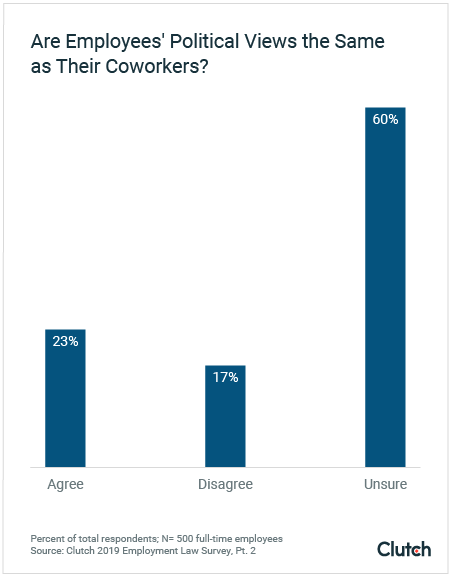
This signals that many people aren’t paying attention to politics at work and rarely, if ever, discuss politics.
Garji Rajan, who heads human resources at Mercer | Mettl, an HR technology and talent measurement firm, says that most people actually don’t talk about politics at work – rather, they are more focused on performing their job.
In fact, politics has a negative association for many employees who prefer simply to perform their job at work.
“Some employees really may be looking to focus on their work duties and responsibilities and not engage in political discussions at work,” said John Snyder, who provides counsel about workplace agreements as a principal at Jackson Lewis P.C., a law firm in New York. “Employees may see little point, and mostly downside, associated with doing so.”
Politics is a disruptive topic that can create a negative office experience for employees who expect their work experience to entail simply doing work,
Key takeaway: Most people don’t expect to work with like-minded colleagues. Most employees disregard or don’t know their coworkers' political views.
Question: If employees don’t know about their colleagues' political beliefs, what are they concerned about when considering whether to apply or work for a company?
Answer: Money, mostly. Fewer than 25% of employees agree it’s important to work for a company that shares their political views.
Politics is low on employees’ priority list when choosing companies to apply to and work for.
Only 24% of employees agree that it’s important to work for an organization that shares their political views.
More than three times that number of employees (76%) are undecided or disagree that they value a company that shares their political views.
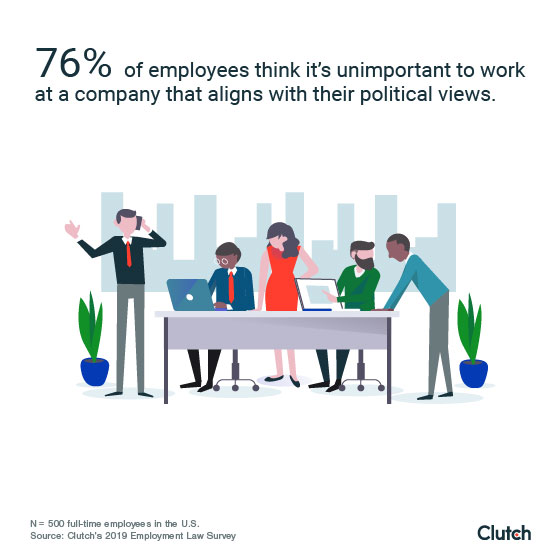
Instead, people work to make money. A 2018 survey from Clutch found that salary was the primary factor job seekers considered among in the U.S.
Key takeaway: Employees consider money and other factors more important than political views when deciding whether to work for a company.
Question: What happens when political discussions happen at work?
Answer: A dominant viewpoint can develop in the office. This can be isolating for employees who don’t share opinions, though less than 10% of employees report feeling discomfort.
Despite a company’s best efforts, political discussions will happen at work, especially among like-minded employees.
When political discussions occur, a dominant viewpoint can take hold in the office and isolate those who fall outside of it.
This is especially the case during times of intense political debate such as an election – the same way discussions about the Super Bowl or an upcoming holiday are likely to become topics of conversation at the office.
“It's hard to say or predict, but given that 2020 will be an election year, the temptation to discuss politics at work may be stronger,” said Michael Steinitz, a senior executive director for professional staffing services at Robert Half, the largest staffing firm for financial and accounting services in the world.
The office is a social environment for some employees, and politics is an easy topic to land on when relationships and conversations extend beyond the purely professional.
This is common in small and collaborative work environments and among people who share political views, according to Ellen Mullarkey, vice president of Messina Staffing, a staffing firm headquartered in Chicago.
“What usually happens is that like-minded workers become closer, usually for a short time, and discuss politics in small groups, oftentimes behind closed office doors,” Mullarkey said.
Like-minded employees are less likely to be offended by a topic when discussing politics at work. This may explain why so few employees report that they’ve experienced political discomfort or discrimination at work:
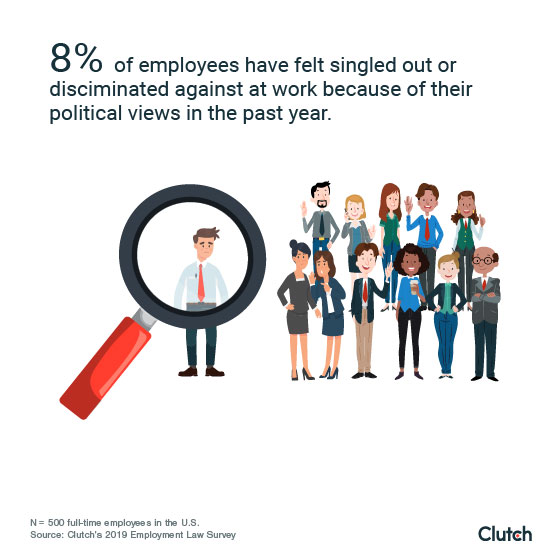
Employees who don’t align with groups of like-minded employees, however, can view political conversations at work as isolating.
Key takeaway: Political discussion is likely to happen at an office and creates discord when a dominant point of view develops.
When political discussion occurs at work among mostly like-minded employees, a dominant opinion can form that creates a standard employees feel pressured to adhere to. Employees who don’t share the workplace's standard political views may feel uncomfortable.
Recent research from Nature Human Behavior supports this concern. In a summary of the research on Harvard Business Review, the authors of the study noted that conflict between work teams whose political ideologies are weighted to one side is more toxic than with teams that are ideologically balanced.
Such was the case for Noel Pinson, an investment advisor who felt isolated as a Democrat in a conservative-leaning office.
Cited in an article on Marketplace, Pinson explained that his experience at this office did not reflect his values.
“I just felt over time just more and more that little voice in the back of my head screaming at me that you’re not living your values working here,” Pinson said.
Though Pinson’s experience had a positive outcome – he ultimately left the company to start his own business – cases of political discomfort can create a hostile work environment and bring enormous financial costs to companies.
“All it takes is one or two [employees] to tie up an employer and cause a lot of expense,” said Jerry Oppel, senior counsel in the Baltimore office of Baker Donelson, a national law firm, who represents companies in employment and labor disputes.
To reduce the risk of creating a hostile environment for employees, Oppel suggests a political expression policy that clearly defines the political topics allowed at work. For example, employees can discuss issues related to wages and collective bargaining.
Question: Does political expression impact productivity at work?
Answer: No, a majority of employees disagree that political discussion decreases productivity. Political discussion doesn’t add value, either: Around half of employees don’t think talking about politics creates a healthy exchange of ideas at work.
Most employees report that political conversations do not disrupt the productivity of their workplace, but they also report that political expression does not add value to its culture.
More than half of employees (55%) disagree that political conversations decrease productivity at their company.
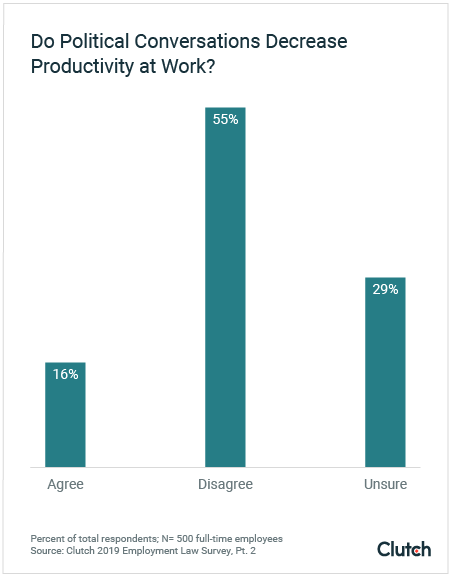
Although political expression won’t impact most employees’ productivity, it doesn’t add value to their experience at work.
Many employees would prefer to avoid exchanging political ideas at all: Nearly half (48%) disagree that differing political viewpoints at work create a healthy exchange of ideas.
Just 32% of employees think that differing political views leads to a healthy exchange of ideas at the office.
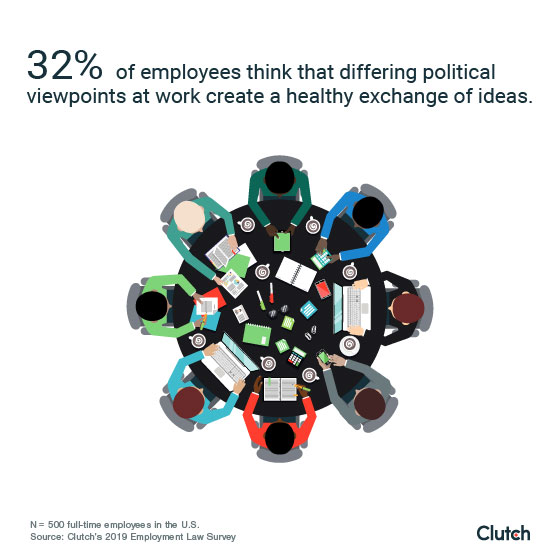
Sharing political viewpoints does not hamper how productive employees are at work. But they would rather avoid political expression than exchange political ideas.
Key takeaway: Political discussion has a net negative effect in the workplace: Although most employees don’t think it impacts productivity, few think it contributes any value to a company’s culture.
Question: Who sets the standard for political expression at work?
Answer: Leadership. Employees would rather company leaders avoid expressing political opinions than take a stance about a political issue.
Employees expect company leadership to foster a culture of respect at work and set a standard that discourages political conversations at the office.
Nearly 40% of employees disagree that company leadership should take stances on political issues that are relevant to their company.
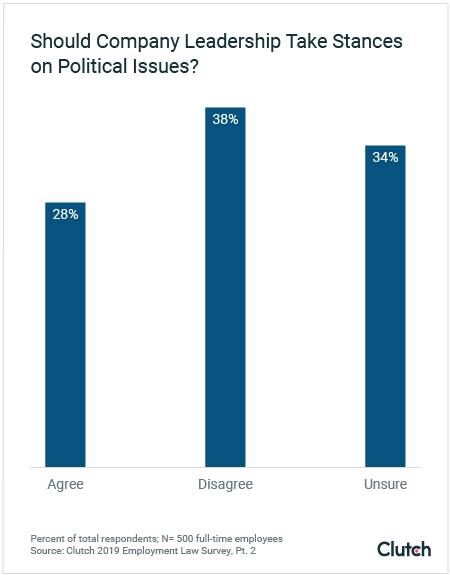
Only 28% of employees support company leaders taking political stances.
“Managers should lead by example,” Steinitz said. “Set the tone from the top that it’s OK to have differing views, and learn to respect others’ opinions.”
If company leaders encourage employees to avoid political discourse at work, it may relieve social pressure for those who feel their viewpoints don’t align with those of their coworkers.
Laura Friedman works as the assistant director of communications for Workforce Opportunity Services, a nonprofit organization focused on professional development for veterans.
She warns that for small companies, in particular, the cultural impact is more profound when leaders take political stances.
“If I hold different political views than my boss, and she was vocalizing hers, I’d feel even less inclined to vocalize mine in fear of whether she knew mine,” Friedman said. “That’s a problem.”
Company leaders who are cognizant of their impact on a company’s culture can promote respect in an office by avoiding polarizing political issues.
Key takeaway: Employees expect company leaders to set a standard that avoids political expression at work.
Question: How do political views affect employee preferences about political expression at work?
Answer: Significantly: Conservative employees are less likely to think it’s important to work at a company that shares their political views than liberal employees but are more likely to think company leaders should avoid political discussion.
People’s political leanings impact their choice about where to work and the office culture they prefer.
Specifically, employees who identify as conservative are more likely to disagree that:
These findings are especially important because employees report that they aren’t aware of their coworkers’ political views.
Without this knowledge, it’s easy for an uncomfortable dynamic at work to occur when someone brings up a political topic that one employee may agree with but another may take offense to.
Friedman discusses politics as part of her job at Workforce Opportunity Services, because it is an agenda-driven company. For those not involved in advocacy, lobbying, or government, however, she suggests avoiding politics to ensure that an individual’s political opinions don’t impact his or her standing as an employee.
“You don’t want to feel passed over for promotion or ostracized or disregarded for projects because of your political views,” Friedman said. “It’s another form of bias. It can work for and against you. That’s why I say politics has no place in the workplace.”
Even if employees know their coworkers’ political leanings, most are generally aware that talking about politics at work can be abrasive, said Rajan, of Mercer | Mettl. He suggests that employees consider the value of their career rather than vocalizing a political viewpoint.
“Employees are fully cognizant of the fact that eventually pursuing [their] own opinions against someone with differing viewpoints for too long can land them in a soup with HR and management, which carries the risk of blotting their portfolio,” Rajan said.
People’s political views shape their preferences and expectations about political discussion at work. Employees who avoid politics, however, will ensure that they do not cause others discomfort and avoid risk to their careers.
Key takeaway: Employees political views affect their opinions about political expression at work. Conservatives prefer company leaders who do not express opinions about political issues.
To many employees, the company they work for not only helps pay the bills but also partially defines their identity.
When company leaders make comments about political topics, those comments often are associated with their company, which in turn reflects on the company’s employees.
“People judge people based off where they work,” Friedman said. “People also need money and jobs. I don’t think people want to be attached to the views of the company’s leaders.”
When employees don't agree with political issues that their company leaders choose to publicly support, they make a choice between following their political values and sacrificing their income and way of life.
It’s increasingly common for company leaders to take stances about political issues, even if employees don't prefer it.
Often, though, company leaders make these decisions with consumers in mind rather than employees. Specifically, many consumers consider a company’s values more important than price and are more likely to shop at a company that supports issues they agree with.
When company leaders take political stances for commercial gain, they do so at the expense of the identities of some of their employees.
Question: How should companies approach regulating political expression at work?
Answer: Political expression policies clarify acceptable political discussion at work, but employees don’t support them. Companies need to balance the benefits of a policy with the impact on company culture.
Employees don’t think formal policies are necessary to regulate political discussion, which makes it challenging for companies to create a culture that both protects employees and caters to worker preferences about political expression at work.
Political expression policies provide clarity about acceptable political expression and should outline how a company complies with employment and anti-discrimination laws.
A political expression policy also creates a legal shield for companies in the case of a hostile workplace or political discrimination complaint. Seeking counsel from a labor law firm will help businesses ensure they are in legal compliance.
“If you're definite and have some rules set out, you stand a better chance. The beginning of definiteness is the end of confusion,” Oppel said. “If you're definite and have some rules set out, you stand a better chance, you stand a better chance of prevailing in any kind of litigation or maybe even preventing it.”
The function and value of a political expression policy for companies don’t translate to support from employees, however. Only 27% support a political expression policy at their company.
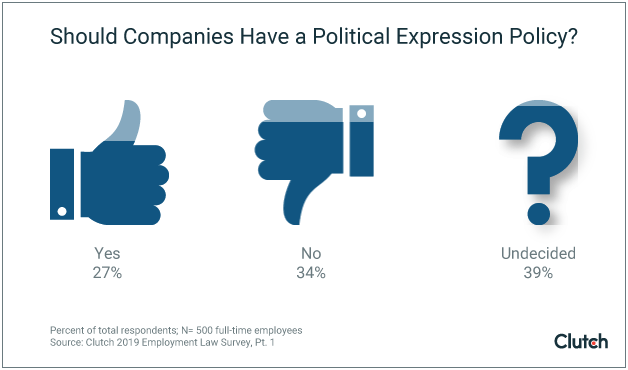
To regulate political expression at work, companies have to grapple with employee preferences and expectations for the workplace.
For example, an employee may feel as if a political expression policy is unnecessary or limits her ability to freely express opinions in the office. Some may feel it discourages colleagues from discussing topics that aren’t explicitly related to work.
Political expression policies, while they provide clarity about acceptable political discussion at work and outline protections for employees, don’t carry much support among employees.
Key takeaway: To regulate political expression at work, companies have to balance the legal benefits of a political expression policy with the lack of employee support for such policies.
Our research indicates that politics are not top-of-mind for employees when choosing where to work or their relationships with coworkers. Rather, most employees are focused on salary and performing their jobs.
Political conversations at work inevitably occur, however, especially during times of political debate and significance, such as the upcoming U.S. presidential election.
When political discussions occur, they often are among like-minded employees, which risks fostering dominant political ideals at the office, especially among smaller companies.
When dominant political ideas form at work, employees who don’t align with these views may experience discomfort. Employees may be better off avoiding political discussion altogether to avoid this scenario and jeopardizing their career or their company.
Ultimately, employees don’t think that politics impacts the productivity of their company but also don’t believe political expression adds value to their company culture.
Company leaders can take cues from employee opinions about political discussion at work to create an environment of respect. Employees find it important for company leaders to avoid taking stances on political topics to avoid impacting their identities and maintaining respect at the office.
Clutch surveyed 500 full-time employees in the U.S. to understand how political discussion and expression impacts company culture.
Respondents work for companies of all sizes: 41% work at companies with 50 employees or fewer; 15% at companies with 51-200 employees; 16% at companies with 201-1000 employees; and 28% at companies with more than 1,000 employees.
Respondents also identify their political leanings across the political spectrum: 34% describe their political attitudes as somewhat or very conservative; 25% describe themselves as somewhat or very liberal; 21% describe themselves as moderate; and 13% describe themselves as apolitical.
![How to Choose an IP Law Firm [With Checklist]](https://img.shgstatic.com/clutch-static-prod/image/resize/715x400/s3fs-public/article/1396ae6bad8e8579446e9c1863db83bb.png)

